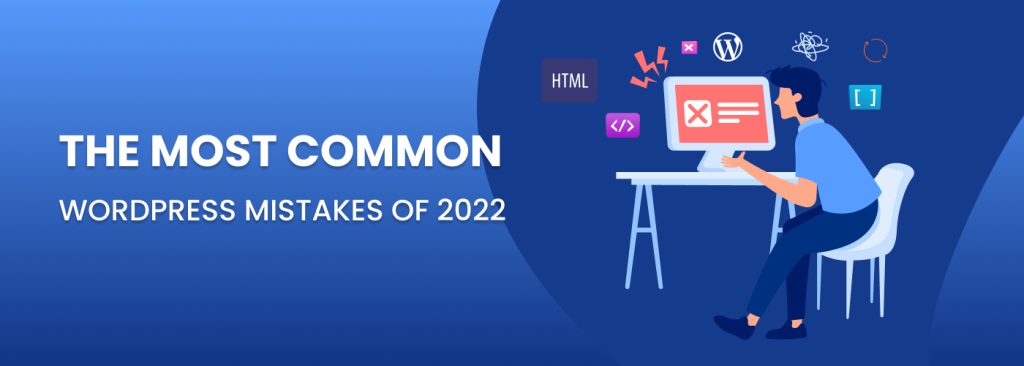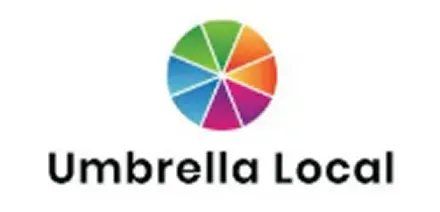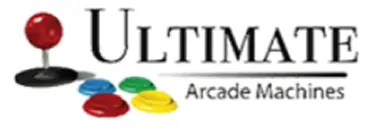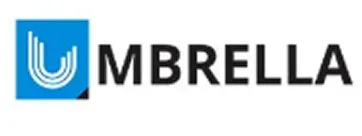The most common WordPress mistakes of 2022
Published On: September 21, 2022

Want to know the most common WordPress mistakes? Making mistakes is a normal habit of all people. People gain knowledge from their mistakes and improve their skills. When you are setting up your WordPress website, your primary focus remains on setting everything up & start posting content on your blog as soon as possible.
There are a few essential parts of WordPress, that you are unacquainted with (when you are an expert in using WordPress blogging).
Here in this article, the top 10 common mistakes are outlined that most WordPress newbies should avoid.
1. WordPress.org vs. WordPress.com
When given the option to select between self-hosted WordPress.org and WordPress.com, the majority of new WordPress bloggers are confused.
It is essential that you know the differences between the two so that you can select the best theme for your brand-new WordPress blog. Almost everyone who wants to build a free personal website can use WordPress.com.
However, if you’re one of those who want complete control over your website, choose WordPress.org. However, you must first purchase WordPress Hosting in order to install WordPress on it. It is up to you to first ascertain your demands and then carefully select your solution.
2. Using default username (admin)
When you start using WordPress, it automatically generates a default username. Because default usernames are predictable to hackers, they can easily launch a brute force attack on your website and obtain your login information to take over your site.
Create a random username using a combination of numbers, letters, and special characters together with a secure password because WordPress allows you to alter the username during installation. This will improve the overall security of your blog. After installing WordPress, you can also modify the Admin Username.
3. Using default URL structure
The default URL structure is used by the majority of new WordPress users, which is bad for both SEO and your users. Default URLs typically grow to be too long and stop working. Whenever, you update your blog, edit the permalinks structure by going under Settings » Permalinks for better performance of your site.
4. Not backing up your website regularly
Many WordPress bloggers commit the serious error of failing to create a backup of their website. It only takes a few minutes for skilled hackers to hack your website, and when it does, you lose several years’ worth of work (that you invested to make your site popular) in a matter of seconds. Your website may occasionally crash as a result of high traffic, server issues, or other technical issues.
As nothing is 100% secured in the world of technology, just take the backup of your site to avoid that painful situation of loss of your valuable data. If you use the WordPress.com blogging platform, go to Tools and then “Export” in the dashboard to take a backup of your blog. If your blog is self-hosted on WordPress.org, you may protect your data by using the phpMyAdmin tool or a backup plugin.
5. Your Blog is not Mobile Friendly
When compared to PC/laptop users, a large percentage of today’s people use mobile devices to access the internet. If your blog is not mobile-friendly, Google may degrade its rating in its search results, and you risk losing a significant portion of website visitors.
In order to capitalize on the trend of mobile browsing fully, you need to use a responsive WordPress theme that adjusts itself automatically regardless of the type of device and screen size. To make your blog mobile-friendly, you may also utilize a mobile plugin.
6. Testing New Products on a Live Site
This seemingly harmless but dangerous error is constantly made. After reading my last point, let’s pretend you want to install a backup plugin on a live WordPress site. Let’s say BackWPUp. However, you choose to skip the extra work and install the plugin straight on the live site.
What happens if anything goes wrong and you have to put your website offline for a few hours to fix the brand-new, unprecedented damage? Let’s look at some of the things you’ll lose:
- Organic traffic from search engines
- Direct referral traffic
- Affiliate income
- Advertisement clicks
- Conversions and sales
- Email opt-ins
You will drop in the search engine rankings when Google sends a searcher to your site and discovers that it is not active.
7. Not Securing your WordPress Backup
Yep, that’s right. A complete backup stored on your computer’s hard drive is just as effective as one stored on a scratched DVD. The most dependable method is to transfer your backup to the cloud. There are several (free) choices available, including Dropbox, Box, SkyDrive, and others. The free BackWPUp plugin or VaultPress are both excellent choices because they automatically publish your backup to the cloud.
8. Installing Too Many Plugins
In our next article, we discussed how the YARRP plugin might result in server resource misuse, which may cause your shared hosting account to be suspended. When you install and activate many useless plugins that you almost ever use, a similar issue comes. This includes the Common WordPress Mistakes.
Understanding the difference between an installed plugin and an activated plugin is important. There are two states for all plugins: active and inactive.
No matter how you install a plugin—through an FTP upload or via the plugin manager—the plugin is always left in the deactivated state by default. The plugin needs to be manually activated in order to work.
The second stage is the active state, where the plugin is active and functioning on your WordPress site
When you have many active plugins, the negative impacts start to show. There are two primary issues that could occur:
Conflicting plugins and plugin themes – A specific plugin (or theme) might not function because of a restriction placed by another plugin (or theme). Let me explain the idea of mutual exclusion in programming. One plugin (or theme) could refuse to let others utilize a certain resource (for an extended period of time). A different plugin that wants to access the resource is unable to do so because it has already been restricted. As a result, the new plugin wouldn’t work.
Buggy plugins- The WordPress repository contains a large number of plugins. Anyone can contribute to it, whether they are a beginner coder or an experienced programmer with ten years of expertise. The difference can be found in the code’s quality, where the latter would undoubtedly excel. Therefore, plugins with a low download count should be avoided. If we do, make sure to test it in an experimental setup.
9. Frequent Theme Changes
Themes are the attire to the WordPress site. Some feature-rich themes like the Total WordPress theme can be used in thousands of different projects – each with a unique layout. Your conversion rate will greatly increase with a clear, well-structured theme.
It’s a normal practice for Novice bloggers (or website owners) frequently switch back from one to another theme. The temptation is simply too great when it comes to WordPress! You have access to thousands of free, wonderfully designed themes right now!
New WordPress users will, of course, not be happy with the theme they have installed and will often switch themes in search of the right one.
10. Publishing Incomplete Posts
This is under the Common WordPress mistakes. Yes, this is some people do that. If you’re one of them, I advise you to stay away from it. Here’s why:
WordPress automatically notifies many search engines when you submit a post, and these engines ultimately begin to index your page. Once a page has been indexed, it typically takes a while until they revisit it to index it again. Furthermore, it relies on how well-known your website is. You might add new content to your post during this time, but the changes won’t take effect until much later. In essence, this seriously affects your SEO campaigns.
People who come to your website through social media platforms will leave and possibly intentionally begin to avoid it if they find that your posts are only half written.
Ready for
Digital Transformation?













